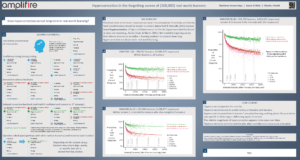Amplifire to Present at Annual Psychonomic Meeting
Dr. Matt Hays, Senior Director of Research and Analytics of Amplifire, and Aaron Glick, Data Analyst, presented their findings on the effects of Hypercorrection in 100,000 Real-World Learners at the 60th Annual Meeting of the Psychonomic Society, which was held November 14th-17th, 2019, in Montreal, Quebec.
What is the Hypercorrection Effect?
Feedback provided after an incorrect response can correct a learner’s misconception. Intuitively, a misconception held with high confidence should be more difficult to correct than one with low confidence. On the contrary, Butterfield and Metcalfe (2001) found that high-confidence errors were hypercorrected; corrections to them were recalled better than corrections to low-confidence errors. In small laboratory studies (e.g., Butler, Fazio, & Marsh, 2011), the hypercorrection effect has been demonstrated to last at least seven days. We present forgetting-curve data from over 100,000 learners that demonstrate the hypercorrection effect persists for over six weeks. We also demonstrate the substantial impact of the testing effect on both the shape of forgetting curves and the magnitude of the hypercorrection effect. We discuss the implications for adaptive educational technology and cognitive modeling.
Click the image below for a full-size version of the presentation.
To learn more about Dr. Hays, click here
About the Psychonomic Society Annual Meeting
The Psychonomic Society is the preeminent society for the experimental study of cognition. Members are cognitive psychologists and include some of the most distinguished researchers in the field. They study the basic, fundamental properties of how the mind works by using behavioral techniques to better understand mental functioning.
At the Psychonomic Society Annual Meeting, cognitive psychologists debate, deliberate, and discuss the most innovative, cutting-edge research on questions concerning memory, learning, problem solving, decision making, language, attention, and perception. The scientific presentations are often concerned with the application of psychology to health, technology, and education as well as their connections to research in biology, chemistry, statistics, computer science, medicine, law, and business.
